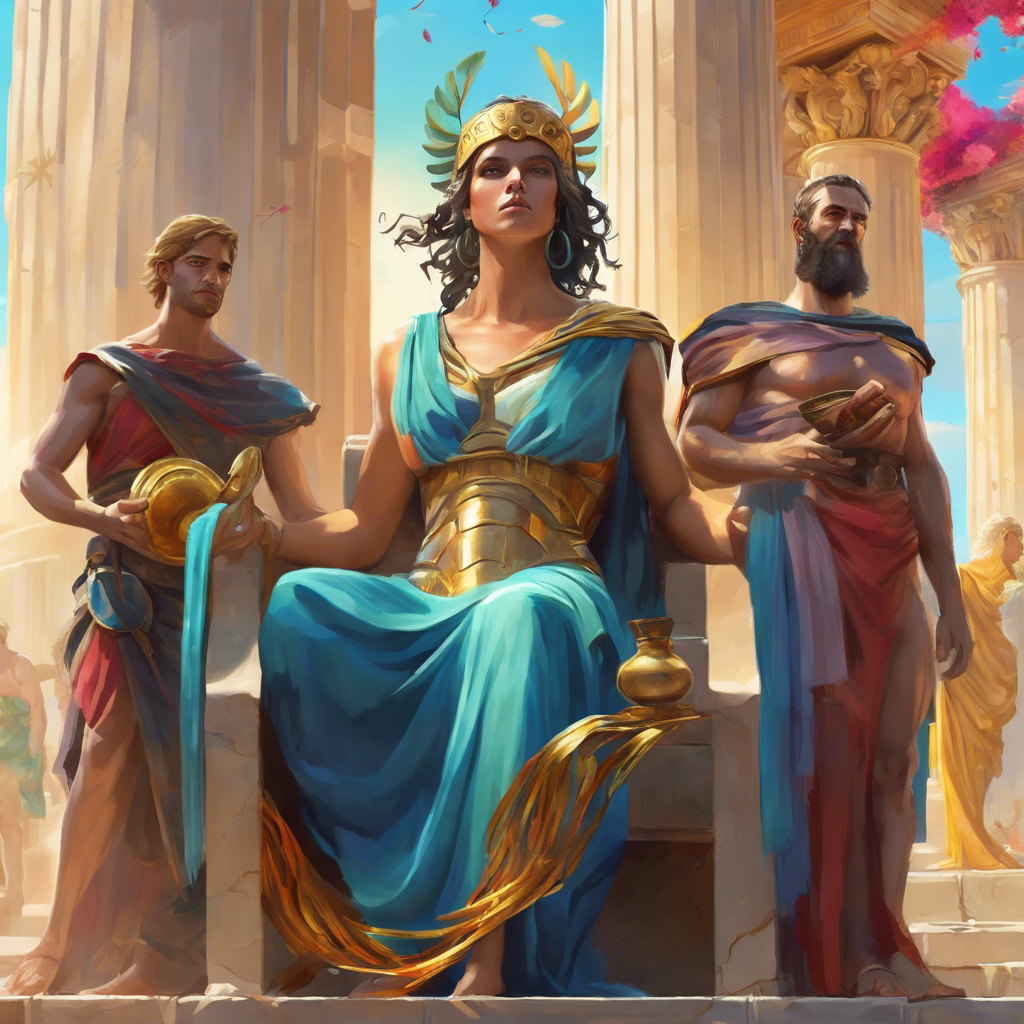Can you imagine a society without lawyers? Not a lawless world, a world with justice and punishment, but without a vampiric class profiting from accident and incident. In Chpt 32: It’s Character Forming I discussed briefly the pillars of ancient Greek moral philosophy (Excellence, Justice, Temperance, Hubris, Reverence and Xenia). I want to explore Justice in ancient Greece and how it was structured and aligned with Greek mythology.
“We Greeks believe that a man who takes no part in public affairs is not merely lazy, but good for nothing”
Thucydides
I will caveat this entire post with the understanding that only between 10 – 20% of the Greek population at the time were considered ‘citizens‘. Generally this was natural born adult males and it mostly excluded women, slaves or foreigners (metics). Citizens were given the rights to bring a case before the court, or to vote or be on a jury. They were also granted the rights to generally free speech, the right to bear arms and individual property rights.
(I make no apologies for the hurt feelings of any lawyers reading this)
Structural Role Play
Greek ‘courts’ were structured far differently to the court of law that we understand today in the West. In ancient Greece there were no lawyers or professional judges. There was no codified law used due to the fact that Greece at that time wasn’t a homogenised state. It existed as a collection of city-states know as Polis (πόλεις), and had regional variations on their ideals. That being said, there were contextual similarities between the city-states, especially that of cultural unity. From this culture developed common bases in law: δίκη (“law, justice”), κύριος (“lord, master”), βλάβη (“injury”). Athenian law is often the focus of ancient Greek democracy and discussions so I will use that as my focus.
Courts in ancient Greece were cheap and run by laypeople, a far cry from todays complex and expensive legal systems. Court officials were paid little and most trials were completed within a day, sometimes quicker. There were no official lawyers and no official judges. A normal case would consist of two litigants arguing if an unlawful act had been committed. They did this in front of a jury of their peers, albeit slightly larger than you might expect. For a public prosecution a case was heard in front of 501 or more jurors, while private suits were heard by 201 or 401 jurors depending on the amount of money at stake.
The modern jury size supposedly evolved from the customs of Germanic tribes around the 11th or 12th Century. Although there is likely a holdover from Roman conquest of Europe, seeing as it is the prevailing view that Roman law did take influence from ancient Greece. This was however neither a linear process, nor a neat integration, of Roman and Greek legal custom with Germanic tribal justice.
Factoid: The adjective ‘draconian’ derives from Draco (lawgiver) who lived 625-600 BC. He was the first recorded legislator of Athens (although some consider him fictional in part). The liberal use of the death penalty in the Draconic code gave rise to the reputation we still use today. All Draco’s laws were repealed by Solon in the early 6th century BC, with the exception of the homicide law.

Process and Pace
Unlike modern juries, the numbers in a jury in ancient Greece were considerable. Citizens from an eligible pool were picked at random, and, depending on the importance of the trial, could number in the thousands. Prior to the trial beginning the jurors swore an oath to uphold the laws and decrees, and to judge based on evidence presented.
Both the accuser and the defendant were given a set amount of time to present their arguments. They could call witnesses, introduce evidence, and use their oratory skills to sway the jury. There was no judge to oversee the proceedings or guide the presentations.
After both sides had presented their argument and presented evidence, the jurors cast secret ballots. There was no deliberation or discussion over the evidence. Each juror was permitted to consider the arguments and vote based on their individual understanding of the case. The exact method of voting varied slightly depending on the period and court, but jurors typically used bronze or clay tokens, placed into one of two urns, to indicate their verdict.
In most cases the simple majority vote was enough to reach a verdict. The officials would count the tokens from each urn and make the decision. On occasion there would be a second vote. The first would decide guilty or innocent, and the second vote would determine the punishment.
This system was designed to be simple, quick, and efficient.
Factoid: The longest running lawsuit in history was Myra Clark Gaines and her battle for her deceased father’s estate. This ran for 57 years, before being finally ruled in her favor in 1891. Her estate (Myra died during precedings) received a fraction of the original estate as it was mostly claimed by creditors and lawyers.

Crime and Punishment
After Solon threw out most of Draco’s laws, he drafted a number of new laws, especially in the category of tort and family law. Tort law dealt with a breach of rights, either harm to a person or his property. In contrast to our modern day laws, these laws were more about defining restitution to the claimant than corporal or capital punishment for the accused. Most crimes were punished through monetary penalties. That being said, more serious crimes were punishable by public flogging or caning or even being confined in stocks.
Crimes against the state received the harshest punishments. Treason, sedition or impiety (disrespect towards the gods or violation of religious practices) were all considered grave offenses. Exile, death and other forms of corporal punishment were typical. Execution was likely reserved for serious crimes like treason, desertion, or cowardice in battle. The specific methods of execution are not entirely clear, but some sources mention throwing criminals from a cliff (Mount Taygetus) as a punishment. Crimes against a person, for example murder, assault or ‘mayhem’ were dealt with in a similar fashion.
Family law dealt with the regulation of the behaviour of men and women. Composing laws on marriage and adoption, inheritances and supporting the role of parents. Greek laws regarding women were restrictive, bearing more in common with current conservative interpretations of Islamic or Hindu societies. Outside the home, they had to stay under constant supervision by their kyrios, or “official guardians”, being most often fathers or husbands, but sometimes children or brothers.
Factoid: The depiction of the Spartans casting enemies into a dry well in the movie adaptation of Frank Miller’s 300 possibly came from the Barathron. This was a deep pit behind the Acropolis into which criminals and the dead bodies of criminals were cast. It was mentioned as early as the Persian wars.

Justice The Divine
Justice in ancient Greece wasn’t just a concept, it was a goddess. Closely related to Lady Justice (Justitia in Roman mythology). You may see depictions on modern buildings holding a balance scale. Dike personified fairness, proper conduct, and the natural order. Upholding these principles wasn’t just a legal requirement but a social and moral imperative that drove Greek society in maintaining social harmony and avoiding divine disapproval. The connection between the law and morality was a core concept of Greek society.
In Greek society honor and social status was paramount. Following the law and acting justly were essential for maintaining one’s good standing amongst peers, and in the eyes of the gods. Conversely, aidos, the fear of shame and social disapproval, could be a powerful motivator. Dishonoring oneself or the community through unjust actions could lead to public scorn. Finally, arete, the pursuit of excellence and virtue, encompassed acting justly and fulfilling one’s role in society.
This marriage of law, morality, and religion influenced the Greek legal system. Judges and juries, though human, were seen as upholding Dike’s principles when enforcing the law. Litigants might appeal to these principles to argue their case, invoking the idea of divine sanction for breaking the law. However, the system wasn’t without limitations. While the ideal was justice for all, social realities like citizenship status could tip the scales in practice.
The virtue of justice consists in moderation, as regulated by wisdom.
Aristotle
Conclusion
Greek justice was never homogenous, neither was it static. From the early draconian laws, to the revised classical period under Solon, it was an ever changing landscape as the society adapted and altered. Intertwined with the laws was a deep belief in justice and equality for all citizens, and a moral and social desire to please the gods (or at least avoid displeasing them!).
The ability for citizens to argue their own case in the court was reliant on their own education in the law. Education in rhetoric (the art of persuasion) and logic was a highly valued skill. Citizens relied on these skills to present compelling arguments, sway the jury with emotions, and expose flaws in their opponent’s case.
The large number of participants in the jury also fostered a sense of civic engagement and responsibility. It engendered active participation in upholding the law and ensuring justice was served. This system was not without its flaws. The wealthier citizens were known to employ articulate and persuasive speech writers in an attempt to sway the jury during the proceedings. Proving again that sometimes money can swing the law in your favor.
“The closer the collapse of the Empire, the crazier its laws are.”
Marcus Tullius Cicero
Our current system has become so complex, something that is somewhat inevitable given the complexity of modern society and structure. Citizens of today cannot be expected to understand the complexities of our laws, in some ways we have made our laws too complicated. It is almost inevitable that the more complex and ridiculous they become, the more chance we have of breaking them through ignorance.
Perhaps we all need our own sober counsel.
Further reading:
Justice and the Face of the Great Mother (East and West)
Law and Punishment in Ancient Athens
Democracy, Justice, and Equality in Ancient Greece


